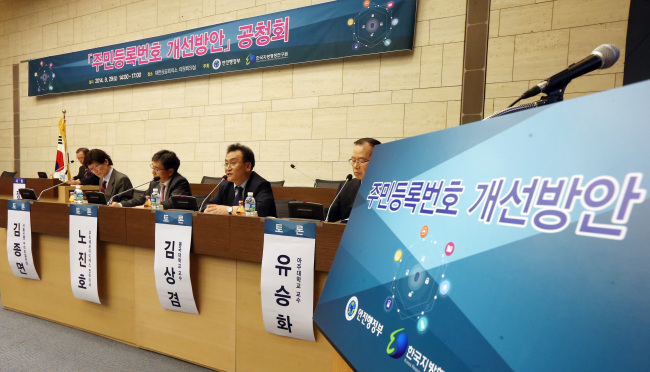The government hosted Monday a public hearing to gather suggestions on its plan to revise the resident registration number system.
The overhaul comes after a series of data breaches raised concerns about the 13-digit numbers that are issued to every Korean citizen at birth, and are commonly used for identification throughout their lives.
“The revamping of the resident number aims to enhance protection of private information, so that people no longer have to suffer from data theft,” said an official from the Ministry of Security and Public Administration, which cohosted the gathering with the Korea Research Institute for Local Administration. “(At the hearing) we will find the best way to minimize the social cost and inconvenience to the public.”
The resident number contains information such as date and place of birth and gender. Because there is only one number per person, it is often used for identification both online and offline and is a primary target for data theft.
The overhaul comes after a series of data breaches raised concerns about the 13-digit numbers that are issued to every Korean citizen at birth, and are commonly used for identification throughout their lives.
“The revamping of the resident number aims to enhance protection of private information, so that people no longer have to suffer from data theft,” said an official from the Ministry of Security and Public Administration, which cohosted the gathering with the Korea Research Institute for Local Administration. “(At the hearing) we will find the best way to minimize the social cost and inconvenience to the public.”
The resident number contains information such as date and place of birth and gender. Because there is only one number per person, it is often used for identification both online and offline and is a primary target for data theft.

Last month, police in South Jeolla Province said they had taken local hackers into custody for allegedly buying the personal information of 27 million people from Chinese hackers. Since the majority of the resident numbers have already already stolen, each number is sold for just 1 won (0.1 cent) on the black market, according to a police report.
A new policy bans public institutions and companies from collecting the numbers, and suggests alternative security options, such as My-PIN numbers. But experts point out that these measures cannot prevent the already-stolen data from being misused.
This prompted the Ministry of Security and Public Administration to come up six options for the new resident number system.
Among the options being considered are: Creating resident numbers using the existing system; creating random numbers, retaining the existing numbers for administrative purposes; and using temporary identification numbers that can be reissued.
But revamping the 46-year-old system can present challenges for the ministry, mainly the cost. According to the ministry’s own estimate, the renovation could cost up to 670 billion won ($636 million). Officials said the actual costs would be even larger, as the private sector will have to apply the changes to their systems as well.
As of now, the most talked-about options both involve using the randomly-issued temporary identification numbers, but one centers on retaining the existing numbers while the other calls for reissuing the numbers for the entire population. While the second option will be most efficient in terms of security, it is also the priciest.
The ballooning costs of the system overhaul may force the government to scrap the plan altogether, officials added.
Whatever the government chooses, experts say the biggest problem for resident numbers is that they are used ubiquitously. A local activist on cyber security mentioned that, while Germany has an ID card called “Personalausweis,” which is roughly equivalent of the resident number, Germans use separate identification numbers for most things, such as health care, tax, and financial transactions.
By Yoon Min-sik (minsikyoon@heraldcorp.com)



















